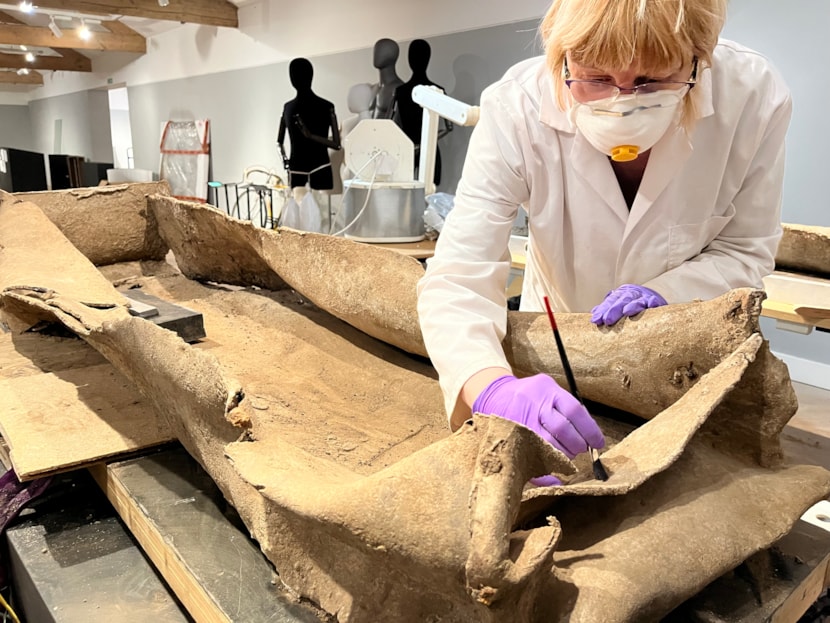
15 Apr 2024
Secrets of city’s ancient Roman coffin to be revealed in new exhibition
An ancient lead coffin which lay buried in a Leeds field for more than 1,600 years is set to be revealed to the public for the first time.
The astonishing discovery, described by experts as a once-in-a-lifetime find, was made during excavation work by West Yorkshire Archaeological Services in a previously unknown site near Garforth.
It contained the remains of a woman aged 25-35, believed to have been of high status and perhaps a Roman aristocrat, who was buried wearing a bracelet, glass bead necklace and a finger ring or earring.
In a fascinating revelation, archaeologists from West Yorkshire Archaeological Services, who carried out detailed analysis, have discovered that the coffin also contained the partial remains of an unknown child, thought to be aged around 10 years old.
Whilst it is not known exactly who the child was or their relationship to the Roman woman, carbon dating of the remains has revealed that their burials took place around the same time, raising intriguing questions about late Roman burial practices in Britain.
The coffin and its delicate lid, which have been extensively warped by centuries in the ground, are currently being carefully conserved and stabilised for display at Leeds City Museum, where they will be mounted in a bespoke case as one of the central exhibits in Living with Death, a new exhibition opening on May 3 exploring how cultures across the world approach death, dying and bereavement.
As well as the coffin, the Garforth dig, which took place in 2022, also unearthed the remains of more than 60 men, women and children who lived close by more than fifteen hundred years ago.
They include both late Roman and early medieval people, with burial customs and objects from both periods found in their graves, including, knives and jewellery.
Kat Baxter, Leeds Museums and Galleries’ curator of archaeology, said: “This is a truly unique and remarkable find which has potentially huge implications for our understanding of the history of early Leeds and those who made their home here.
“The discovery of the remains of a second individual within the coffin is fascinating, particularly as they belonged to a child. It poses some interesting questions about how people more than 1,600 years ago treated their dead.
“The Roman lead coffin itself is also the only one ever discovered in West Yorkshire and the site has provided us with new opportunities to study life and death in ancient Yorkshire. We’re delighted to be able to display the coffin so quickly after excavation, and we’re looking forward to sharing this amazing piece of history with our visitors.”
As well as the lead coffin, Living with Death will include a range of exhibits which explore the different ways people experience death, dying, and grief.
They will include personal stories, and objects from across the world and throughout history such as a spectacular, elaborate Ghanaian coffin shaped like a lion, on loan from ArtDocs, a Roman period painted mummy portrait from Egypt, on loan from Manchester Museum, The University of Manchester, and objects related to Mexican Day of the Dead celebrations.
A series of talks, workshops, and family-friendly events will complement the exhibition throughout the year, and it is hoped the exhibition will spark wider conversations about how we approach the subject of death.
Councillor Jonathan Pryor, Leeds City Council’s deputy leader and executive member for economy, culture and education, said: “This fascinating exhibition will reveal some astonishing facts and information about the history of Leeds and how people lived and died in our city centuries ago.
“But it will also explore how the subject of death spans and unites different cultures around the world, and I’m sure it will provide some fascinating insights for visitors.”
Living with Death has been developed with input from local communities, and is supported by Dying Matters Leeds, part of a national initiative promoting public awareness of dying, death, and bereavement.
Living with Death, which is generously sponsored by Co-op Funeralcare, will be at Leeds City Museum from May 3, 2024 until January 5, 2025 and is free to visit.
For more information, please visit: Living with Death - Leeds Museums & Galleries
ENDS
For media enquiries contact:
Leeds City Council Communications team
communicationsteam@leeds.gov.uk